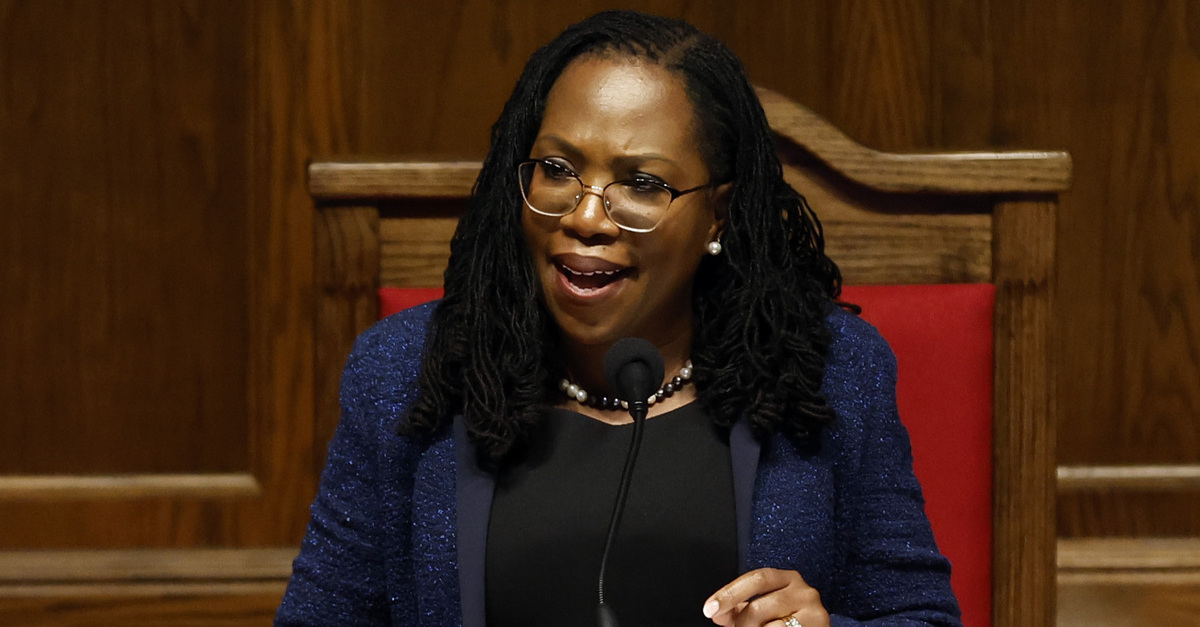
Supreme Court Justice Ketanji Brown Jackson, the first Black woman on the nation’s highest court, speaks at the 60th Commemoration of the 16th Street Baptist Church bombing Friday, Sept. 15, 2023, in Birmingham, Ala. (AP Photo/Butch Dill)
In one of six opinions released on Friday, the U.S. Supreme Court sided 7-2 with fuel companies that claimed they had standing to challenge California’s regulatory attempts to reduce emissions by limiting the production of gas-powered vehicles, much to the dismay of dissenting Justice Ketanji Brown Jackson.
The conservative majority led by Justice Brett Kavanaugh and joined by liberal Justice Elena Kagan decided that fuel companies had standing to sue the U.S. Environmental Protection Agency (EPA) over the Biden administration’s Clean Air Act waiver reinstatement for California, even though the Trump administration’s past and present policy undercuts the ability of states to follow and enforce stricter emissions rules than the federal government.
For Kavanaugh, Kagan, Chief Justice John Roberts, and Justices Clarence Thomas, Samuel Alito, Neil Gorsuch, and Amy Coney Barrett, that the fuel companies had standing to sue the EPA over the climate change-focused waiver was “evident” based on the high court’s precedents and based on evidence that, under California regulations, the companies would “take in less revenue than they would in a free market.”
As a result, the case of Diamond Alternative Energy LLC v. EPA was kicked back down to the U.S. Court of Appeals for the District of Columbia Circuit for a consideration of the merits of the fuel companies’ claims.
“The government generally may not target a business or industry through stringent and allegedly unlawful regulation, and then evade the resulting lawsuits by claiming that the targets of its regulation should be locked out of court as unaffected bystanders,” Kavanaugh wrote.
While Jackson and Justice Sonia Sotomayor each dissented separately, Jackson was more forceful and suggested that the Supreme Court did little other than shoring up “unfortunate” public perceptions that the court will contort its standing doctrine when pro-business interests are at stake — while leaving “ordinary citizens” out in the cold, whether in criminal, death penalty, or work-related cases.
“When courts adjust standing requirements to let certain litigants challenge the actions of the political branches but preclude suits by others with similar injuries, standing doctrine cannot perform its constraining function,” Jackson began. “Over time, such selectivity begets judicial overreach and erodes public trust in the impartiality of judicial decisionmaking.”
“Today’s ruling runs the risk of setting us down that path. The Court shelves its usual case-selection standards to revive a fuel-industry lawsuit that all agree will soon be moot (and is largely moot already),” she added. “And it rests its decision on a theory of standing that the Court has refused to apply in cases brought by less powerful plaintiffs. This case gives fodder to the unfortunate perception that moneyed interests enjoy an easier road to relief in this Court than ordinary citizens. Because the Court had ample opportunity to avoid that result, I respectfully dissent.”
Jackson surmised that the ruling “will no doubt aid” fuel companies in future “attack[s]” on the Clean Air Act and prove costly for the court’s reputation, at a time when “many” see it as an institution “overly sympathetic to corporate interests.”
“This Court’s simultaneous aversion to hearing cases involving the potential vindication of the rights of less powerful litigants — workers, criminal defendants, and the condemned, among others — will further fortify that impression,” she wrote.
In closing, Jackson described the majority as “remarkably lenient” toward gas companies yet “stern” in “cases concerning the rights of ordinary citizens” — potentially damaging “Americans’ faith in an impartial Judiciary” and undermining the Supreme Court’s “long-term credibility[.]”

